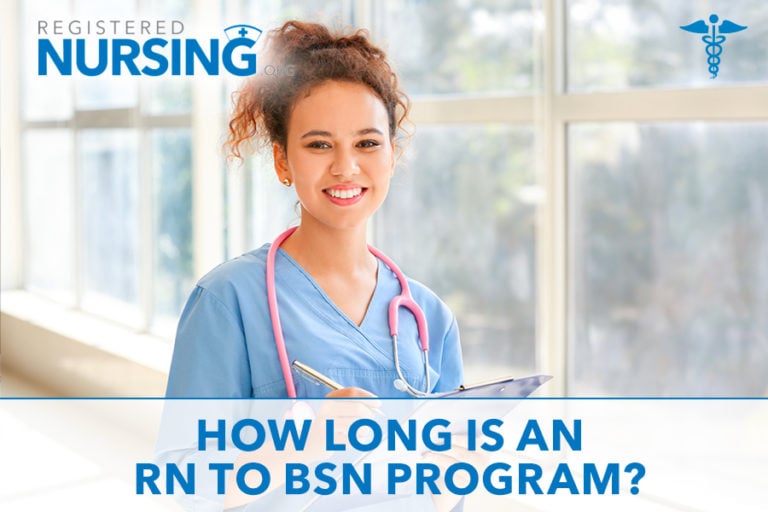How Long Will It Take to Complete an RN to BSN Program?

Becoming a Registered Nurse (RN) is a significant accomplishment, but for many RNs, pursuing higher education is a natural progression in their careers. This often leads them to consider enrolling in a Bachelor of Science in Nursing (BSN) program through an RN to BSN bridge program. The RN to BSN program is designed specifically for RNs who hold an associate degree or diploma in nursing and wish to earn a BSN. One of the most common questions aspiring RN to BSN students have is, “How long is an RN to BSN program?” Below, we will explore the duration of RN to BSN programs, the factors affecting program length, and how to make the most of your educational journey.
Understanding RN to BSN Programs
Before we delve into the specifics of program duration, let’s take a moment to understand the purpose and structure of RN to BSN programs. These programs are designed to build upon the knowledge and skills acquired during an RN’s initial education and experience. They aim to provide RNs with a broader and more comprehensive understanding of nursing practice, including leadership, research, community health, and evidence-based practice.
Key features of RN to BSN programs include:
- Advanced Coursework: RN to BSN programs typically include advanced nursing courses that delve deeper into nursing theory, research, and practice. These courses help RNs develop critical thinking skills and a broader understanding of healthcare.
- Clinical Experience: While many of the clinical skills required for RN licensure are already acquired during an RN’s initial training, RN to BSN programs may offer clinical experiences in more specialized areas of nursing or community health.
- Flexibility: RN to BSN programs are often designed to accommodate working nurses. They frequently offer online or part-time options, allowing RNs to continue working while pursuing their BSN.
READ MORE: Discover Nursing Careers and Specialties
Now, let’s explore the factors that can influence the duration of an RN to BSN program:
Program Structure
The structure of an RN to BSN program can vary from one institution to another. Some programs are offered in a traditional semester-based format, while others use accelerated or compressed schedules. The structure of the program can significantly impact its length.
- Traditional Semester-Based Programs: These programs follow a traditional academic calendar, with courses typically offered in the fall and spring semesters and sometimes during the summer. Full-time students may complete the program in about 2 to 3 years, while part-time students may take longer.
- Accelerated or Fast-Track Programs: Some RN to BSN programs are designed to be completed more quickly. These programs often feature shorter terms or more frequent start dates, allowing students to progress through the curriculum at a faster pace. Accelerated programs may be completed in 12 to 18 months on a full-time basis.
- Online or Distance Learning Programs: Online RN to BSN programs offer the flexibility to complete coursework from anywhere with an internet connection. These programs may allow students to progress through the curriculum at their own pace, potentially speeding up or extending the program’s length based on individual preferences and availability.
Credit Transfer and Prior Learning
Another significant factor influencing the length of an RN to BSN program is the amount of credit an RN can transfer from their previous education and experience. RN to BSN programs typically require a certain number of credits to earn the BSN degree. The more credits an RN can transfer, the shorter the program will be.
- Transfer Credits: RN to BSN programs often grant credits for prior nursing coursework completed during an associate degree or diploma program. The number of transfer credits varies but can significantly reduce the time required to complete the BSN.
- Prior Learning Assessment (PLA): Some programs offer opportunities for RNs to demonstrate their knowledge and skills through assessments or examinations. Successful completion of PLA can result in additional course credits and shorten the program.
- General Education Credits: In addition to nursing credits, students typically need to complete general education requirements. The number of general education credits required can vary between programs and impact program length.
Enrollment Status
The enrollment status of a student—full-time or part-time—can also influence the duration of an RN to BSN program. Full-time students typically take a heavier course load each semester, allowing them to complete the program more quickly. Part-time students, on the other hand, may spread their coursework over a more extended period to accommodate work or other commitments.
- Full-Time Enrollment: Full-time students often take a full course load each semester, which can lead to program completion in a shorter timeframe, typically within 2 to 3 years.
- Part-Time Enrollment: Part-time students may take fewer courses each semester, extending the duration of the program. Part-time RN to BSN programs may take 3 to 4 years or longer to complete.
Individual Progress and Pace
Finally, an RN’s individual progress and pace within the program can affect its duration. Some RNs may choose to accelerate their studies by taking additional courses or studying during the summer. Others may need to adjust their pace to accommodate work, family, or other responsibilities.
Tips for Making the Most of Your RN to BSN Program
While the duration of an RN to BSN program can vary, there are several strategies you can employ to make the most of your educational journey:
Plan Ahead
Before enrolling in an RN to BSN program, carefully review the program’s curriculum and requirements. Understand how your prior coursework and experience will be evaluated for credit transfer. Planning ahead can help you set realistic expectations for program length.
Maximize Transfer Credits
Take advantage of any opportunities to transfer credits from your previous nursing education. Ensure that your transcripts accurately reflect your prior coursework and achievements.
Consider Enrollment Status
Determine whether full-time or part-time enrollment is the best fit for your circumstances. Full-time enrollment may result in a shorter program, but part-time enrollment offers greater flexibility for balancing work and other commitments.
Take Summer Courses
If possible, consider taking summer courses to accelerate your progress. Many programs offer summer sessions which can help you complete required courses more quickly.
Explore Online or Hybrid Options
Online or hybrid RN to BSN programs can provide greater flexibility in terms of when and where you complete coursework. This flexibility may allow you to adjust your pace to fit your schedule.
Seek Support and Resources
Take advantage of academic advising, tutoring, and other support services offered by your institution. These resources can help you stay on track and manage your coursework effectively.
How Long is an RN to BSN?
On average, RN to BSN programs take anywhere from a year to a year and a half; however, many factors determine exactly how long your RN to BSN program will take. One way to better pinpoint your RN to BSN program length is by calculating how many credits you already have. The more credits that are accepted by your new school, the more likely you'll finish earlier. Here's a general estimation for full-time students:
| Previous Credits Earned | Semesters/Courses | Time to Completion |
|---|---|---|
| 0 | 8-10 Courses | 2-3 Years |
| 0-30 | 6-8 Courses | 1.5 to 2.5 Years |
| 30-60 | 4-6 Courses | 1-2 Years |
| With an ADN | 2-4 Courses | 1.5 Years or Less |
READ MORE: Fastest RN to BSN Programs for 2024
Other Factors that Influence How Long an RN to BSN Takes
While the duration of an RN to BSN program is influenced by program structure, credit transfer, enrollment status, and individual pace, additional factors can impact the length of time it takes to complete the program.
- Work Commitments: Many RNs pursue their BSN while working full-time or part-time. Balancing work responsibilities with coursework can extend the program’s duration, especially for part-time students who may need to limit their course load.
- Family Responsibilities: Family obligations, such as caregiving for children or aging parents, can also affect the time available for studying and attending classes. RNs with significant family responsibilities may choose a part-time enrollment option to accommodate their schedules.
- Clinical Requirements: Some RN to BSN programs have clinical requirements beyond what was completed during initial RN training. Fulfilling these additional clinical hours can extend the program’s length, particularly for students who need to arrange clinical placements around their work schedules.
- Professional Development Opportunities: RNs may participate in professional development activities during their BSN studies, such as conferences, workshops, or certification programs. While these activities can enhance skills and knowledge, they may also require time away from regular coursework, potentially prolonging the program.
- Financial Considerations: Financial constraints may impact an RN’s ability to enroll full-time or take additional courses. Working while studying or pursuing financial aid options may be necessary but can affect the program’s duration.
- Program Requirements: Each RN to BSN program has specific requirements for graduation, including minimum GPA thresholds, completion of capstone projects, or passing scores on standardized exams. Meeting these requirements within the designated timeframe is essential for program completion.
Latest Articles & Guides
One of the keys to success as a registered nurse is embracing lifelong learning. Our articles and guides address hot topics and current events in nursing, from education to career mobility and beyond. No matter where you are on your nursing journey, there’s an article to help you build your knowledge base.
Browse our latest articles, curated specifically for modern nurses.



